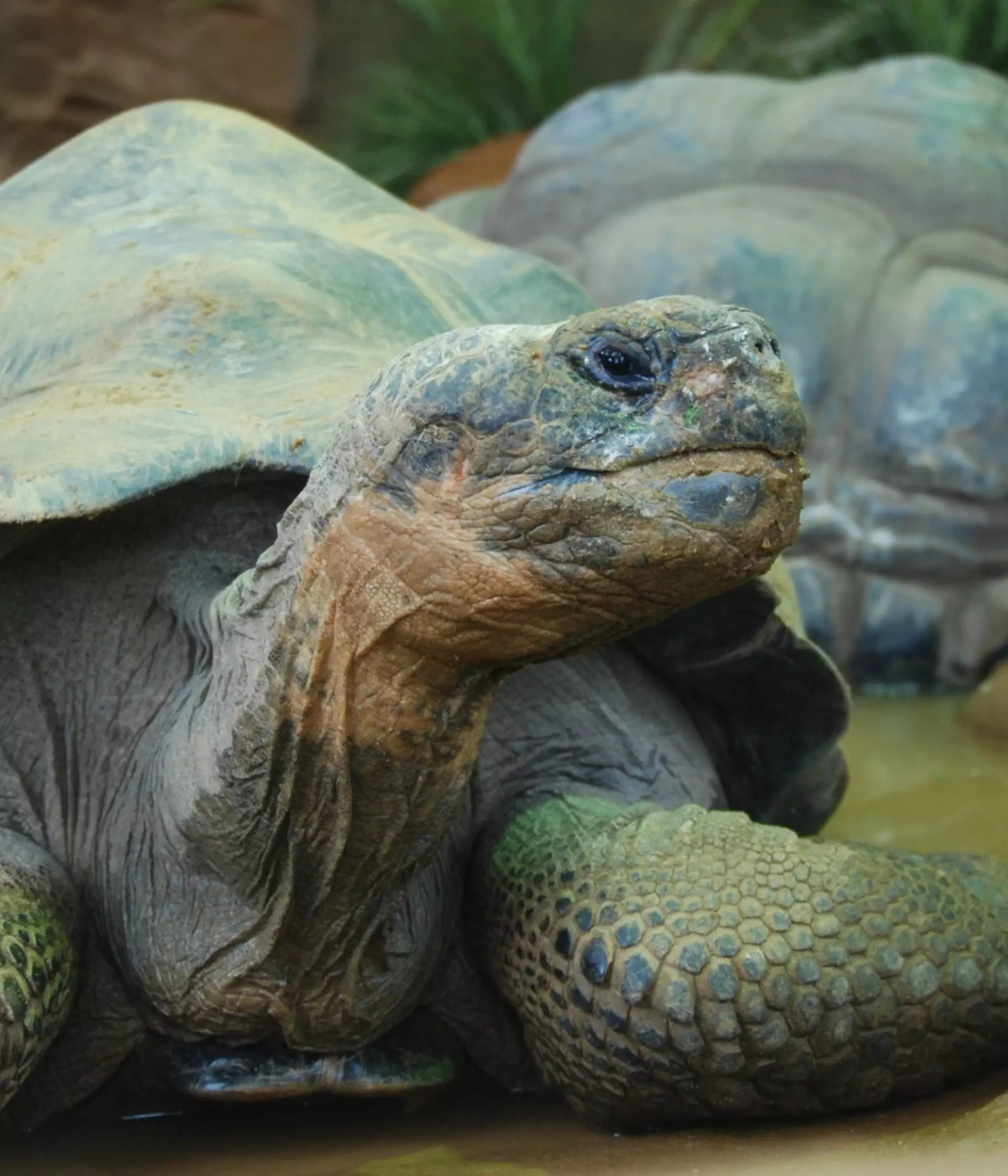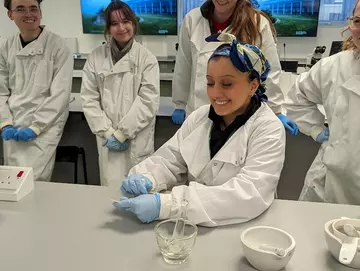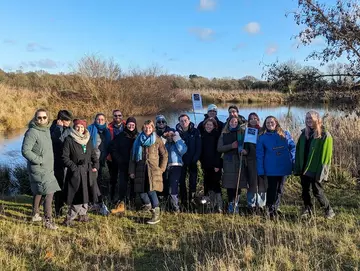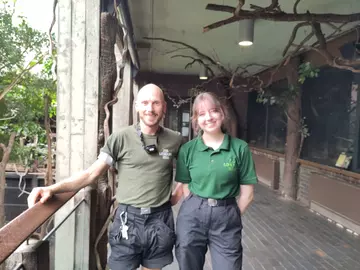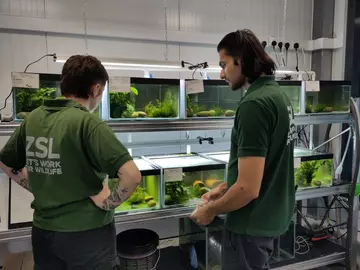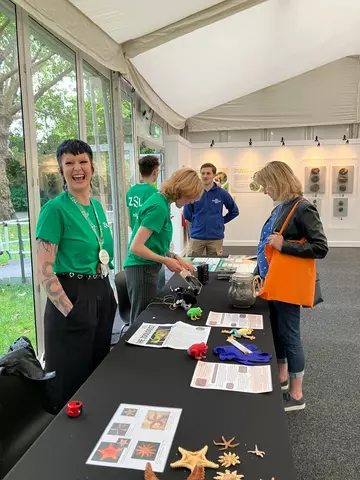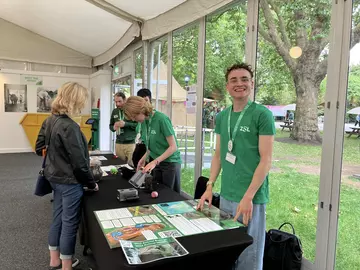Since its inception this world-class specialist Masters course has produced hundreds of graduates, originating from dozens of countries.
It provides wildlife researchers with a critical understanding of the management of wild animals and the epidemiology, treament and control of wildlife disease. The course provides practical exposure to wild species in a captive setting and an understanding of their health, welfare and conservation. This masters also provides training in research methods relevant to the study of wildlife in both captive and wild settings.
The Masters in Wild Animal Biology is taught jointly by the Royal Veterinary College and the Zoological Society of London. You will benefit from working and studying alongside veterinary graduates taking the MSc in Wild Animal Health as well as learning from internationally renowned experts in their field.
MSc Wild Animal Biology: Course content
This specialist Masters course is completed over one-year full-time study, commencing in the Autumn. The course is delivered through two terms of lectures, seminars, tutorials and problem-based learning, with modular examinations, followed by a research project over the summer months (May-August), prior to the final assessment. Teaching covers taxa e.g. mammals, reptiles, birds and the disciplines that influence these taxa, such as epidemiology, infectious diseases, conservation and management. The bulk of teaching takes place at The Zoological Society of London, Regents Park, with time also spent at Whipsnade Zoo and Royal Veterinary College, Camden and Hawkshead Campuses. Both Certificate and Diploma levels of study are available, there are no part-time or distance-learning options available.
The course provides participants with:
- A critical awareness of current problems in wildlife diseases with implications for wildlife conservation and welfare
- A new insight into interventions for the health management of captive and free-living wild animals
- A systematic understanding of the biological principles underpinning wild animal conservation and management, and the epidemiology, diagnosis and control of wildlife disease
- Basic competence in veterinary techniques and preventative medicine for wild animals
- A conceptual and practical understanding of how established techniques of research and enquiry are used to create knowledge in the field of wild animal health
- A comprehensive understanding of scientific skills, including a critical review of the scientific literature, and design and analysis of laboratory or field studies
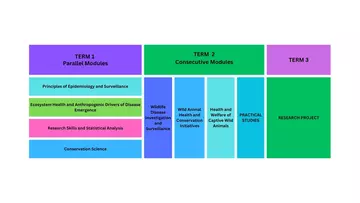
For a complete list of programme-level intended Learning Outcomes and modules within the course, see our Programme Specifications
Applicants must have (or expect to receive) a university first or second class honours degree in Biology, Zoology, Animal Biology or the veterinary sciences.
We are particularly keen to see evidence of relevant work experience in a zoo, wild animal hospital or in wild animal research.
English Requirements
Course Directors:
Module Leaders:
Principles of Epidemiology and Surveillance: Dr Julian Drewe
Ecosystem Health: Dr Andrės Valenzuela Sánchez and Prof Andrew Cunningham
Research Skills and Statistical Analysis: Dr David Brodbelt and Dr Ruby Chang
Conservation Science: Dr Marcus Rowcliffe and Louise McRae
Wildlife Disease Investigation and Surveillance: Dr Becki Lawson and Dr Simon Spiro
Wildlife Animal Health and Conservation: Dr Malcolm Nicoll
Health and Welfare of Captive Wild Animals: Dr Amanda Guthrie and Lewis Rowden
Practical Studies: Dr Taina Strike, Dr Simon Spiro, Dan Simmonds, Hayley Jakeman and Alex Thomas
Research Project: Dr Chris Yesson and Dr María Díez-León
The Graduate School
The Royal Veterinary College
Royal College Street
London NW1 0TU
United Kingdom
Email: admissions@rvc.ac.uk
Tel: +44 (0) 207 468 5147
Graduates of the MSc in Wild Animal Biology have gone on to pursue successful careers in wildlife management (with government agencies in both developing and developed countries), wildlife rehabilitation, wildlife-related research (at universities and zoological collections) and zoo management.
Positions obtained by our graduates include:
- A range of paid internships including Camera Trapping & Ecosystem Assessment
- Laboratory Technician
- Pathology Technician
- Trainee Reserve Warden
- Zoo Keeper
- PhD researcher
- Graduate Ecologist
Employers of our graduates include:
- ALcontrol Laboratories
- Zoological Society of London
- RSPCA
- Commonwealth Scientific and Industrial Research Organisation
- Save the Rhino
- The Ecology Consultancy
- Sea Watch Foundation
- The International Society for Ecology & Culture
- United Nations (UN)
- Yorkshire Wildlife Trust
Sasha Dines
Sasha Dines graduated from the Wild Animal Biology (WAB) course in 2016 and now works as the head field specialist at Oceans Research, South Africa.
Her recent work includes working under Dr. Enrico Gennari on White Shark population dynamic studies and cetacean studies amongst many other projects.
Her main duties in this role included managing the student research internship, organising their schedule, teaching and supervising all of the research projects, maintaining equipment and databases and ultimately ensuring the interns are receiving an excellent learning experience.
In addition to her main scheduling responsibilities she has continued her interests in marine mammal biology by helping to run the marine mammal stranding course at Oceans and is currently helping to develop a national stranding response network.
Femke Broekhuis
Femke Broekhuis graduated from the Wild Animal Biology (WAB) course in 2007, which launched her career in cheetah research.
Supervised by Dr. Sarah Durant, Femke conducted a dissertation on cheetah habitat selection after which she was awarded the Tom Kaplan Prize scholarship do a PhD with the Wildlife Conservation Research Unit (WildCRU) at the University of Oxford.
She then conducted 4/5 years of research on cheetahs in the Okavango Delta assessing cheetah interactions with lions and hyaenas.
Femke is currently Project Director of the Mara Cheetah Project in Kenya where she aims to determine the current cheetah population in the Greater Mara Ecosystem, identify major threats and mitigate against them by implementing a science and community-based conservation approach.
Lauren Smith
Lauren Smith, a graduate from the 2015/2016 WAB cohort, is a Postdoctoral Research Officer in infectious disease modelling at the Walter and Eliza Hall Institute of Medical Research in Melbourne, Australia.
She currently works on projects relating to the control of infectious diseases in the Asia-Pacific region, including the development of diagnostic tools to identify individuals recently infected with Plasmodium vivax.
Since graduating from the Wild Animal Biology MSc, her PhD and postdoctoral research has addressed questions related to the management of animal populations and infectious diseases, and the welfare of domestic animals. This has included using statistical and mathematical models to assess the effectiveness of free-roaming dog population management, rabies control strategies, canine distemper virus dynamics, African swine fever in domestic pigs, and cetacean ecology and conservation.
Xinli Yap
Xinli Yap, who graduated from the course in 2010, worked as Conservation and Research Officer in Wildlife Reserves Singapore. Her main duties included: liaising with governmental and non-governmental organizations and individuals on local and regional conservation projects; organizing seminars, talks and conservation events; preparing materials and conducting public outreach programmes; and conducting in-house scientific research. She has now moved on to work in spearheading the wildlife hazard management programme at Changi Airport.
Lydia Tiller
Upon graduating from the 2008/2009 class, Lydia worked on carrying out research on elephant cognition in Thailand. She worked for a scientist called Dr Joshua Plotnik who is a Newton post-doctoral research fellow from the University of Cambridge. Additionally, she acted as a field team leader for the Earthwatch programme that is run at the field site. Now, she works for Save the Elephants and is the Research and Science Manager for their Human-Elephant Co-Existence Program. Save the Elephants are working to preserve vital migration corridors, maintain elephant-friendly landscapes and promote tolerant relationships between elephant and man.
Nicola White
Graduated from MSc WAB in 2004 and worked her way up in the RSPCA, becoming the Senior Scientific Officer: Exotics & Wildlife Trade, responsible for leading science-based projects, activities and programs relating to the welfare of exotic pets and wildlife trade.
Prior to this she was Scientific Information Officer for the RSPCA's wildlife department, responsible for researching and checking wildlife content for the Society's publications and website, compiling reports, providing wildlife data and responding to wildlife enquiries.
She now works as Senior Manager, Wildlife Campaigns for Humane Society International / UK, responsible for managing HSI/UK's wildlife campaigns including pushing for a ban on imports from trophy hunting.
"For anyone wishing to pursue a career in wildlife conservation, this course is a fantastic opportunity to gain the skills, knowledge and contacts to help you reach your goal. As a recent 2018 graduate of the MSc in Wild Animal Biology, I can wholeheartedly say I immensely enjoyed the course and all the wonderful experiences it provided. You are given the opportunity to work with some world-renowned experts in conservation, gain hands on experience in the practical management of captive animals and gain skills in conducting post-mortem investigations. What this course provides is over and above most master’s courses. On a personal development level, you gain essential critical evaluation skills that are imperative for any progression into higher research or education and the opportunity to make contacts with those working at Zoological Society of London, a leading charity in wildlife conservation." - Hannah Davidson, United Kingdom
"The MSc in Wild Animal Biology is a unique opportunity to benefit not only from the knowledge and experiences of experts from around the world, but also from the exchange of ideas between the zoologists and veterinarians that come to the course from a variety of backgrounds. I learned far more than I expected to in the space of just one year." - Avanti Wadugodapitiya, Sri Lanka
"I completed the MSc Wild Animal Biology course in the years 2014-2015, and all I can say is I really enjoyed it. Although I liked my undergraduate university course, there was a definite lack in the practical side in terms of seeing real-life animal cases and witnessing firsthand how captive animals are managed. The collaboration between the Royal Veterinary College and the Zoological Society of London meant I was able to see the best of both worlds - see how veterinary medicine is progressing alongside the improvement in keeping wild animal collections in captivity. The link also meant we were able to witness some fascinating post mortems- a personal highlight was when I was present during the post mortem of a giant porcupine. Through my course I was able to gain many connections, and it also opened my eyes to the amount of work and research taking place in the wildlife epidemiology field. I would recommend this course to anyone who is passionate about conservation and research, and interested in all the different types of work going on worldwide." - Inez Januszczak, United Kingdom
"After several years of searching for the right graduate program, I was inspired to pursue the MSc Wild Animal Biology course. I had been working as a big cat keeper at Busch Gardens in hometown of Tampa, Florida for six years. While it was a difficult decision to leave a career I loved, I went on the journey to study abroad to gain a greater understanding of conservation and wild animal management on a global level. This unique course encompassed all aspects of conservation -- in situ and ex situ wild animal management, veterinary medicine, epidemiology, and research. The lecturers were amazing, truly leaders in conservation. The research component of the degree was exhilarating as we could design any project based on our interests. I chose to study polar bear behaviour, where I spent time at zoos in five different European countries, gaining insight into their ex situ management. The very best part of the course was collaborating and developing close friendships with people from all around the world." - Ashleigh Lutz, USA
"It was really fantastic for me. I got theoretical as well as practical knowledge from this course which proved invaluable in my career when working on the rehabilitation of native wildlife. My MSc dissertation provided me the opportunity to study a particular species, the Common Swift, which has since been my main focus of interest and further, future research." - Enric Fuste, Spain
